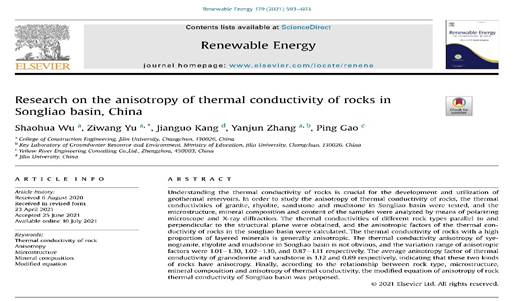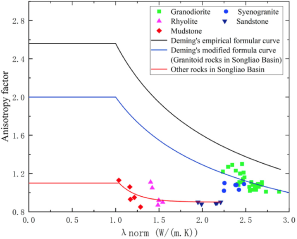In July 2021, Associate Professor Yu Zimang’s team from College of Construction Engineering of Jilin University published a paper entitled “Research on the anisotropy of thermal conductivity of rocks in Songliao basin, China” in the international famous academic journal Renewable Energy, which is of great significance for the development of geothermal energy in the study area.

In recent years, China's new energy sources have continued to grow rapidly, and geothermal energy has attracted much attention because of its renewable properties, large storage capacity and wide distribution. Among many medium and deep geothermal energy projects, Songliao Basin has become one of the popular target areas for geothermal research in China by its high potential geothermal resources. For reservoirs with certain stratigraphy, the anisotropy of rock thermal conductivity is very important to determine the reservoir heat extraction efficiency. To address the above issues, the research team conducted experimental studies on different kinds of rock samples from the Songliao Basin. The anisotropy model based on TCS thermal conductivity test method was mainly established, and the particle size, structure, shape and mineral composition of different types of rocks were observed by polarized light microscopy observation and X-ray diffraction, and the correlation analysis was carried out by combining the mineral composition and the anisotropy factor of thermal conductivity of rocks.
The distribution range of thermal conductivity and anisotropy factor of different types of rock samples were further measured, and the characteristics of thermal conductivity anisotropy of different types of rocks were summarized. At the same time, a correction equation for the anisotropy factor of thermal conductivity of different types of rocks in Songliao Basin was proposed.

The results were funded by the National Natural Science Foundation of China (No. 41602243&41772238) and the Engineering Research Center of Geothermal Resources Development Technology and Equipment, Ministry of Education of China, and were completed by Associate Professor Yu Ziwang, College of Construction Engineering, Jilin University, with the participation of graduate students Wu Shaohua and Kang Jianguo, and with the strong support of Professor Zhang Yanjun and Dr. Gao Ping for this project.
DOI link to the original paper: https://doi.org/10.1016/j.renene.2021.06.113
